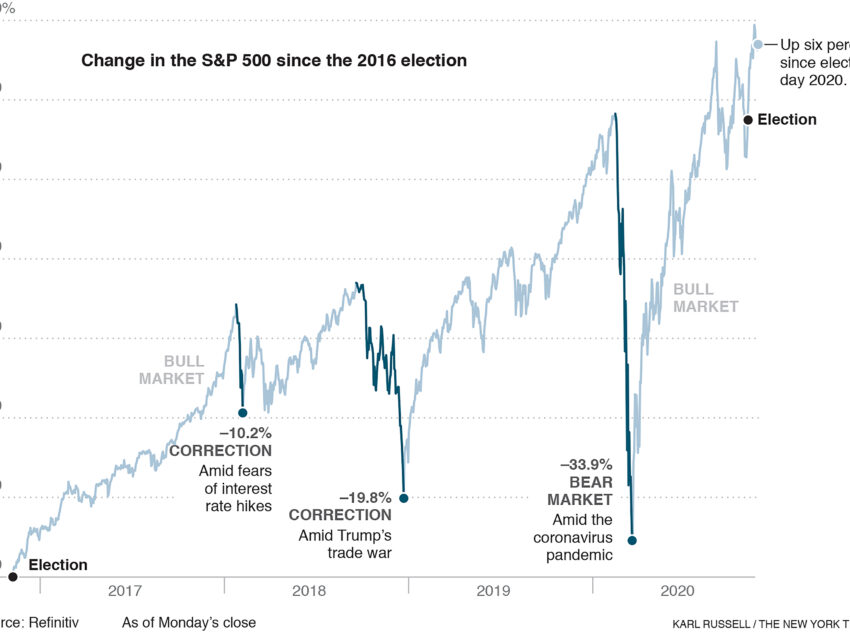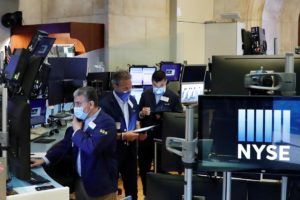https://www.boston.com/news/national-news/2020/11/24/wall-street-itching-to-unfollow-trump
In the closing weeks of the presidential campaign, President Donald Trump began telling his supporters that if former Vice President Joe Biden was elected, market mayhem would follow.
“If Biden wins,” he told a cheering crowd at an airport near Reading, Pennsylvania, on Halloween, “you’re going to have a stock market collapse the likes of which you never had.”
That didn’t happen. Instead, the stock market has notched record highs since Biden emerged as the winner, as investors celebrated both the prospect of an end to election-year political uncertainty as well as progress on COVID-19 vaccines. And as Inauguration Day approaches, Trump’s grip on the collective psyche of investors appears to be receding, too.
Investors of all political persuasions say they are ready to turn the page on what was a profitable but extraordinarily politicized and stressful period for the financial markets, where they had to contend with an unpredictable force whose pronouncements frequently moved stock prices. For the most part, investors supported Trump administration policies; it was the president’s unpredictable tweeting they found hard to stomach. In the past four years, Trump used his bully pulpit to praise and berate companies, escalate a trade war with China and signal the economy’s strengths before official announcements. In the process, his Twitter account became a singular source of market volatility.
“I just want my life to go back to normal,” said Barry Ritholtz, a money manager in New York who did not vote for Trump. “And I don’t mean pre-pandemic normal. I mean pre-golden-escalator-to-hell normal,” he said — a reference to Trump’s famous 2015 ride down the escalator in Trump Tower, at the end of which he announced his candidacy. “I just want the noise level to quiet down.”
The weekend Biden became president-elect, Ritholtz went to Twitter with one goal in mind: unfollow as many accounts in the Trump orbit as possible. In recent years, Ritholtz’s Twitter timeline had grown crowded with accounts — such as those of Trump’s children or press officers — that he felt he had no choice but to follow as he managed roughly $1.7 billion in client assets.
Like no other president
U.S. presidents and political leaders don’t often train their focus on individual companies — at least in public. In 1962, concerned about rising inflation, President John F. Kennedy publicly excoriated steel executives for planned price increases. At a news conference in which he singled out U.S. Steel by name, Kennedy said those executives showed “utter contempt” for the American public. The episode, which was followed by threats of antitrust investigations of the industry, spooked investors and helped set off a significant market slump.
But in recent decades, even as stock ownership became much more widespread, presidents such as Ronald Reagan and Bill Clinton — who both presided over booming stock markets — shied away from direct commentary on companies or markets. Probably, they calculated that the political reward of closely associating themselves with a bull market wasn’t worth the risk of being blamed for a bust that could — and in both cases did — come.
Not Trump. Almost from the moment he was elected, he adopted the stock market as a kind of real-time, multitrillion-dollar barometer of his own performance. Since taking office, he has sent tweets or retweets with stock market references more than 200 times, and made scores of statements spotlighting the market’s rise under his administration.
“Broke all time Stock Market Record again today,” he wrote on Twitter last December. “135 times since my 2016 Election Win. Thank you!”
When stocks have slumped, the president publicly framed falling prices as the work of those he considers political opponents, including the Federal Reserve, congressional Democrats and the news media. He has publicly threatened and castigated major American companies, facing off with Amazon.com over its tax payments and deals with the U.S. Postal Service; with General Motors, Ford and Carrier — then a subsidiary of United Technologies — over plans to shutter plants; and with Lockheed Martin and Boeing over the costs of fighter jets and replacements for Air Force One.
Trump has disclosed market-moving information after private discussions with executives and appeared to hint at upside surprises from economic data that his office was privy to. He has demanded that the Fed cut interest rates to prop up the market. He has treated serious policy developments — such as the twists and turns of his trade war with China — with his typical flair for showmanship, unveiling his changing positions in a hail of unexpected tweets that sent share prices tumbling on multiple occasions.
“He is very much an outlier in terms of his focus on the stock market,” said B. Dan Wood, a professor of political science at Texas A&M University, who has compiled a database of presidential statements on the economy. “I think no former president and likely no future president will emphasize the stock market as much as Trump has,” he said.
Trump tweets, Wall Street weeps
Trump’s focus on the stock market prompted Wall Street’s money managers, bankers, analysts, investment advisers and other professionals — who usually rank day-to-day political developments low on the ladder of market-moving concerns — to follow the president’s missives on Twitter, either by joining the platform or getting briefed on it regularly.
“There was just so much more material in this administration,” said Kristina Hooper, chief global market strategist at investment management firm Invesco, who has been watching financial markets since 1995. “We just didn’t hear as much from past presidents.”
The ride was rocky from the start. On the night Trump won in 2016, stock futures plunged 5% as investors unwound bets premised on a Hillary Clinton presidency. But it didn’t take long for a rebound; once investors recovered from the shock of his victory, they saw that unified Republican control in Washington all but assured a giant tax cut for corporations and wealthy individuals.
The S&P 500 climbed 19.4% in 2017, with Trump signing the long-awaited tax cuts into law in December. Most analysts cite the tax cut as the administration’s strongest credible claim to credit for the rise in stocks.
But by early 2018, Trump’s approach to policymaking was having a far different effect. Markets consistently slipped after Trump began to ratchet up talk of higher tariffs on global trading partners such as China and Europe. Stocks slipped 10% in that year’s first quarter and fell nearly 20% in the fourth quarter.
On several occasions, Twitter messages from the president tipped a previously positive market into significant declines. On Dec. 4, 2018, stocks tumbled more than 3% after Trump declared himself a “Tariff man” — just two days after U.S. and Chinese officials negotiated a truce in the trade war between the two countries.
Throughout 2019, sporadic Twitter messages from Trump about the trade war continued to rattle investors, even though the market gained 29% over the year as the Federal Reserve abandoned plans to raise interest rates.
Even in the middle of the coronavirus pandemic this year, the president’s messages on Twitter continued to unsettle investors. For instance, on Oct. 6, when he abruptly announced on Twitter that he was pulling out of negotiations for a fiscal stimulus with congressional Democrats, stocks swung to a loss.
Where do markets go now?
Overall, stock investors have done well during Trump’s four-year term, even though there’s significant debate about whether the market’s strong performance has come because of or despite his presence. Including dividend payments, investors that own the S&P 500 stock index are up more than 70% between Election Day in 2016 and Nov. 3, when Trump was defeated.
The answer is likely both. The uncertainty and market shocks that came from his freewheeling approach to making and announcing policies may have been a headwind for stocks, but his steep tax cuts almost certainly were a boon to markets.
“The stock market would have been even stronger if he wasn’t in a trade war with China,” said Jason DeSena Trennert, chief investment strategist at Strategas Research Partners and a supporter of Trump. “But otherwise, I think it’s hard not to give him a lot of credit for the market.”
And while professionals debate the direct effect of Trump’s extraordinary relationship with markets, his outsize presence has increasingly linked politics and markets in the minds of everyday investors. “Clients, for sure, have brought up politics more in the last four years than in the previous 30 years of my career,” said Paul Schatz, who manages roughly $90 million in assets for clients largely in New York, Connecticut and Florida.
But now, as the country prepares for the transition to a Biden administration, investors almost certainly won’t have to worry about an out-of-the-blue tweet from the president toppling the markets. Although some worry that Trump could have more market-moving surprises up his sleeve before he leaves town, others expect that the markets will feel very different come Jan. 20.
“I think investors, market watchers might get a little bored,” Hooper, of Invesco, said of a Biden presidency. “I don’t know if they’ll complain. But they might get a little bored.”
Get Boston.com’s browser alerts:
Enable breaking news notifications straight to your internet browser.

















